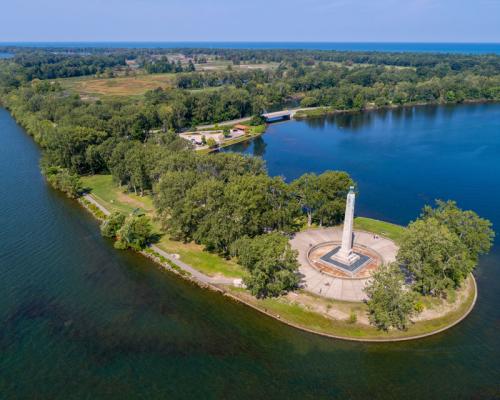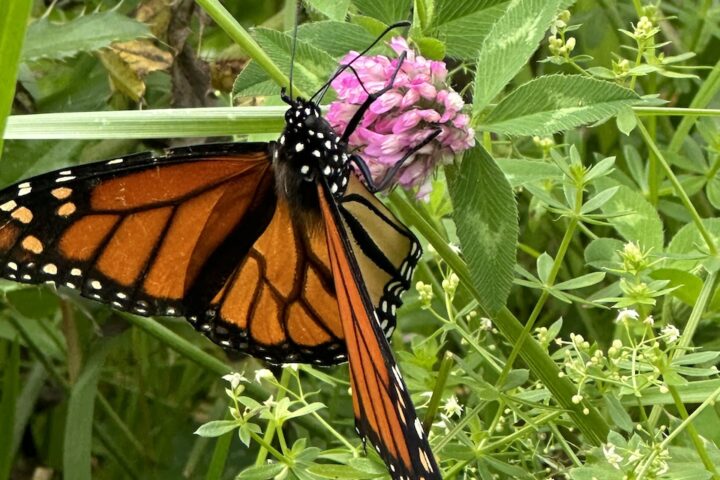Five years ago, perceptive staff members at the Delaware Highlands Conservancy (DHC) recognized an increase in the number of women who own and manage forestland. In exploring this trend, they discovered that women landowners often feel they lack access to information that would help them make wise decisions about the land they love.
To meet this need, the Conservancy—serving the Upper Delaware River region of Wayne and Pike counties in PA and Sullivan and Delaware counties in NY—partnered with the USDA Forest Service at Grey Towers National Historic Site in Milford, PA to launch the Women and Their Woods (WaTW) initiative, which offers educational programs to women forest landowners.
A Women’s Network
WaTW is a network of forest landowners and professionals working together to cultivate women’s connections to and care of healthy forests. At its roots, it’s a conversation of the heart. In its fullest expression, it has the potential to contribute to land conservation to an unprecedented extent and land trusts have the opportunity to be leading voices in that conversation.
Landowner Maggie Heyward, who participated in a four-day WaTW retreat last fall, had this to say: “As a forest landowner and as someone who loves our property, stewardship for future generations is my top priority. Being with other women was important to me because I think women approach forest stewardship a little differently.
“I now feel that I have a good network of resources—people and information—to use to educate others about good forest stewardship practices. I deeply appreciate the support in trying to do the right thing with the land.”
Since its inception, WaTW has grown to include women from across the mid-Atlantic region who serve as mentors for other landowners in their communities in the proper stewardship of their lands. In 2011, the Conservancy partnered with Penn State Natural Resources Extension to offer the first four-day educational retreat for women forest landowners. The event featured workshops led by professionals from PA DCNR, the PA Game Commission, Penn State University, Oregon State University and the US Forest Service.
Attendees learned the basics of mentoring other women landowners along with forest management topics such as forest ecology and tree identification, forest hydrology, improving wildlife habitat, determining the value of forestlands, silvicultural techniques and estate planning. The result is a friendly, peer-learning environment and connection to a network of educated landowners and natural resource professionals.
Making Comfortable Connections
The “kitchen table” approach is an important aspect of the program’s success, helping to create the camaraderie that takes the conversation to deeper levels.
It allows for the kind of bonding that women do best. And it provides an opportunity for the empowerment that takes place when a woman has the chance to share her story—and to learn from the knowledge and experience of others.
Delaware Highlands Conservancy Stewardship and Education Coordinator Amanda Subjin was instrumental in launching the initiative and has been the driving force for its continued development.
“It’s vital to engage this portion of the landowner population and it takes a different approach,” explains Amanda. “Tapping into women’s connections is energizing and occurs more readily in the comfortable atmosphere that arises around women networking at the events. It supports women who may struggle to give voice to the connection that exists to their land.”
“We seek to partner with our land to promote healthy sustainable woodlands,” wrote landowner Susan Benedict in a recent newsletter. “We are natural nurturers and will pass our knowledge to the next generation.”
When her father passed away, Susan’s family voted her manager of their family’s forest. Beyond the many efforts she made to educate herself in forest management, Susan kept a promise to her father to walk the property and practice good stewardship.
“I became familiar with its wildlife, its water and its trees. I found beautiful spots and new wildflowers and learned about vernal pools and butterflies and literally found the home for my soul. My promise to him to walk the property and learn it gave me a deeper appreciation for its uniqueness and the breadth of knowledge required to manage it properly.”
PA landowner Elle Morgan concurs. “When it comes to land, it’s best to stay connected and keep planning for the future,” she says. After attending the WATW retreat, she wrote of a newly found appreciation for all that happens on her family’s land. “I’m looking forward to sharing this knowledge with my family members so we can continue to enjoy this land through future generations.”
An Eye On the Future
Amanda is now working with a national team to create a ‘ToolKit’ that will be made available to anyone ready to start, promote or invigorate their own peer learning network, woodland owners group or WaTW group. She also contributes to the WomenOwningWoodlands.net website, a national resource.
“Reaching out to these women landowners continues to provide us with an opportunity to steward lands we have not—or may never—protect with a conservation easement agreement,” explains Amanda. “It enables us to further the message of land conservation and estate planning and provides a means to properly manage forest lands without a legal agreement.”
“We want to spread the word about how the land trust community can participate in this essential educational program for women forest landowners and how it benefits our work of land conservation and the protection of our critically important forest lands,” she adds.
For more information, contact Amanda Subjin, Delaware Highlands Conservancy at 570-226-3164 or [email protected]. Also, visit http://extension.psu.edu/womenandtheirwoods or www.DelawareHighlands.org.



